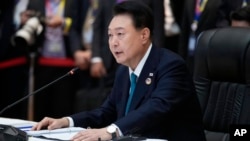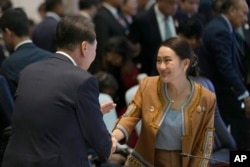South Korean President Yoon Suk Yeol's tour of Southeast Asian countries shows Seoul has stepped up the country's role in supporting regional security, but there are limits to what it can do to help them push back against China's growing aggression, analysts say.
Yoon made several pledges to support regional security during visits to the Philippines, Singapore and Laos, where he attended the closing ceremony of the ASEAN summit on Thursday.
He promised South Korea's help in modernizing the Philippine military, agreed to South Korea's active participation in multilateral drills with ASEAN countries, and upgraded ties with ASEAN to a comprehensive strategic partnership.
Yoon also affirmed the importance of maritime security and promoting freedom of navigation and overflight in the South China Sea.
The pledges are seen by analysts as part of Yoon's plan to make South Korea a pivotal global state by demonstrating a greater commitment to the defense of a rules-based world order.
Pivotal state
A South Korean Foreign Ministry spokesperson told VOA Korean on Tuesday that steps taken by Yoon during the trip reflect the country's "willingness to strengthen cooperation with ASEAN countries across the board," including "bolstering cooperation on the defense sector."
The spokesperson added that South Korea will continue to help maintain maritime security based on the rules-based order in the South China Sea as it builds trust and enhances strategic communications with China.
China claims most of the South China Sea as its sovereign maritime territory, and its vessels have repeatedly engaged dangerous maneuvers against the vessels of countries — such as the Philippines — that dispute that claim.
South Korea "can play a niche role in contributing towards the defense capabilities of regional countries to protect their maritime domain against China's intrusions," said Rahman Yaacob, research fellow in the Southeast Asia program at the Lowy Institute.
"South Korean weapons systems are cheaper than those of the U.S. and are being used by some NATO countries," Yaacob said. "Therefore, Seoul could be an important arms supplier to regional countries" as an alternative to U.S. weapons."
In a joint press conference with Philippine President Ferdinand Marcos Jr. after their meeting on October 7, Yoon said Seoul will support Manila's military modernization plan.
The Philippines is seeking to procure advanced fighter jets, submarines and missiles in its third phase of a five-year modernization plan that began in 2023.
South Korea has sold FA-50 fighter jets, anti-ship cruise missiles, frigates and corvettes to the Philippines in the past decade.
South Korea is also expected to deliver FA-50 fighter jets to Malaysia in 2026 after a deal was signed last year.
Facing hurdles
While these efforts are noteworthy, analysts say they are not enough to push back against China's growing military might.
South Korea "is unlikely to play an operationally or strategically meaningful role on the South China Sea beyond the occasional coordinated joint maritime cooperative activities," said Evan Laksmana, a senior fellow at the International Institute for Strategic Studies.
South Korea has participated in multilateral military drills with Southeast Asian countries, such as the annual U.S.-led Cobra Gold held in Thailand in March and the Southeast Asia Cooperation and Training exercises held in Singapore and other participating countries in August.
In delivering the 47th Singapore Lecture on October 9, Yoon said South Korea will actively participate in multilateral drills with ASEAN countries as it expands engagement with China to seek common interests based on a rules-based international order.
"Yoon has been more willing to increase South Korea's support for regional security" than his predecessor Moon Jae-in, "but he has also recognized the need for restraint in calling out China directly," said Terence Roehrig, professor of national security affairs and a Korea expert at the U.S. Naval War College.
"South Korea can help along the margins," but "offsetting China's strength is near impossible" in the region, Roehrig said.
VOA contacted the Chinese Embassy in Washington for its comments on South Korea's efforts to increase security cooperation with ASEAN countries and was referred to the Chinese Foreign Ministry, which has not yet replied.
China and Russia on Friday blocked a joint declaration issued at the East Asian Summit in Laos, according to Reuters, citing an unnamed U.S. official. The participating countries comprised the 10 ASEAN countries and eight partners, including China, Japan, South Korea, Russia and the United States.
Beijing and Moscow objected to a clause that says the United Nations Convention on the Law of the Sea "sets out the legal framework" for carrying out all maritime activities.
A U.N. tribunal ruled in 2016 that China was in violation by operating within the Philippines' exclusive economic zone, a maritime area that extends 200 nautical miles beyond a nation's territorial sea.

